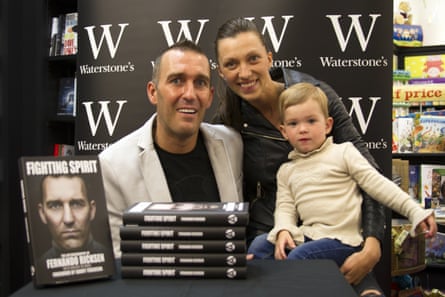The call came just after 10am. Vincent de Vries, Fernando Ricksen’s ghostwriter and loyal friend, had known for a long time that this dreadful day was coming. It was Veronika, Fernando’s wife, at the other end of the phone and the news was devastating. Ricksen, who had been living with motor neurone disease (MND) for almost six years, had died in the early hours at St Andrew’s Hospice in Airdrie. He was 43 years old.
Even if there is relief that the suffering is over, the sense of loss is heartbreaking for those close to Ricksen, in particular his six‑year‑old daughter Isabella, a framed photo of whom stood on the tray-table above the bed where her father spent the last nine months of his life. In his darkest moments – and it is impossible to imagine the mental anguish that Ricksen experienced at times – it was the image of that beautiful little girl that kept him going. She was, he proudly said, his inspiration.
Ricksen’s courage and bravery knew no bounds. He was given 18 months to live when diagnosed in October 2013, yet from day one his attitude was “no surrender”. Even when he was unable to talk and barely able to move as he entered the final stages of MND, which is an uncommon and incurable condition that damages the functions of nerves and muscles, he refused to give up.
“I like living too much, I’m not ready to go,” Ricksen said when we met at his hospice.
It was a deeply moving interview on that February afternoon and quite unlike any other. Propped up in his bed, Ricksen answered questions with his eyes for more than an hour, scrolling across the screen to select the letters and words that his voice-computer read aloud once the sentence was complete. It was humbling to watch.
Physically, MND had brutally taken its toll. Looking gaunt and frail, Ricksen was unrecognisable from the powerful footballer who ran through brick walls for Fortuna Sittard, AZ Alkmaar, Rangers and Zenit St Petersburg during a colourful and chaotic career during which he won plenty of medals and even more enemies. Mentally, however, he was as sharp as ever. His answers were thought-provoking one moment – everything from euthanasia to religion was discussed – and laced with humour the next.
Midway through our conversation it was pointed out to Ricksen that he had described Veronika as his “guardian angel” in his autobiography, and with that in mind he was asked how he would have coped without her. The silence in the room while Ricksen searched for the right letters was broken with laughter by all of us (Veronika and De Vries were present too) when Ricksen replied: “I don’t remember ever saying that about her!”

Although there was a twinkle in his eye after that comment and several other moments when Ricksen cracked jokes that lightened the mood, it was impossible to escape the desperate sadness of his situation. The free spirit who had lived life at 100mph as a player could no longer do anything for himself. “I’m angry about the disease,” he said. “Angry that I am dependent on other people.”
Former teammates would occasionally come to visit but, truth be told, there were only a handful of people on whom Ricksen could really depend towards the end. Pauline Glen, who organised fundraising events in Glasgow for him, was one. Ricksen said that he enjoyed being the centre of attention again at those nights, but there was another reason behind them being organised. “We only have his pension, €1,300 [a month] – that’s all we’re living on,” Veronika said.
When De Vries went to visit Ricksen 10 days ago, he sensed it would not be long. His condition was getting progressively worse and De Vries immediately felt something was not right as he entered the room. As Ricksen’s eyes moved slowly across the screen, he selected “t” but there was a long pause before he got to “i”. De Vries knew his friend was more than tired.
Amid the overwhelming sense of sadness after the news of Ricksen’s death became public came a reminder of his reply to another question in that interview: when the awful day comes, some people will feel that you are in a better place, that you are no longer suffering and finally have peace. What would you say to that?
“They are absolutely right,” Ricksen said.
